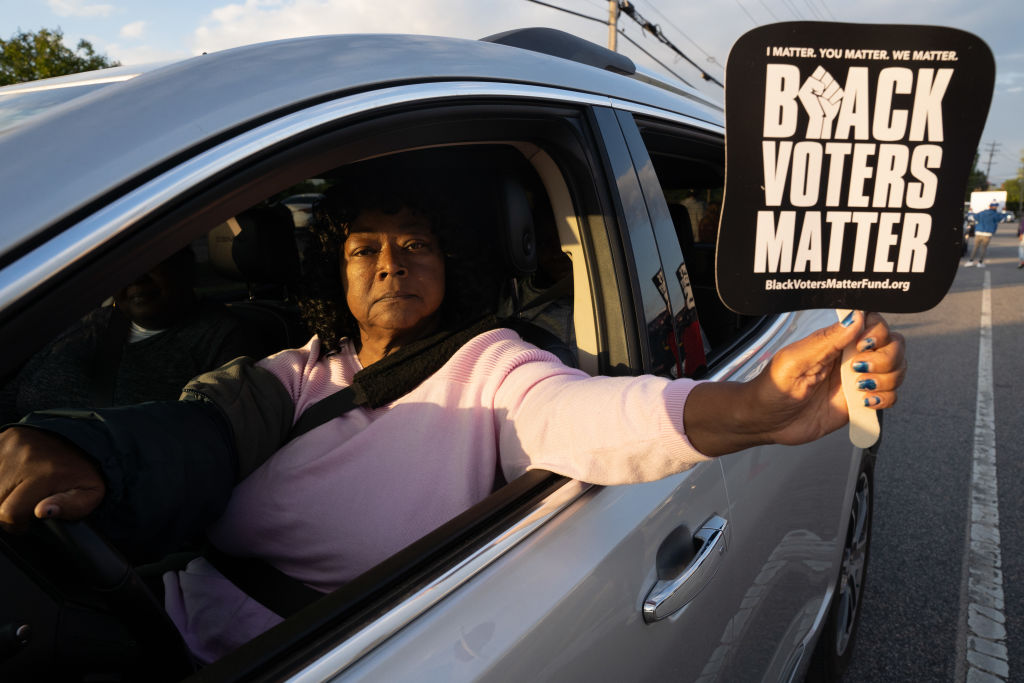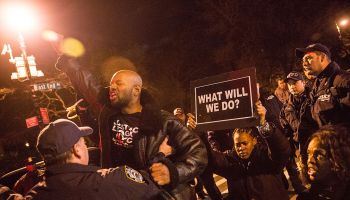
Source: Sean Rayford / Getty
A little over two weeks before election day, voters across the country are gearing up to or already engaging in an early voting period characterized by uncertainty around suppressive voter laws and a clear path forward for replicating wins in 2020. Yet, voters are still showing up – and in historic numbers.
In Georgia, over 135,000 early voters cast their ballots on day one, exceeding 2018’s midterm record by nearly 25 percent, and we have also exceeded 2020 early vote numbers. While this is just the spark we need ahead of November 8th, this historic effort will only heighten Republican attacks on our freedom to vote. If we want to ensure voter turnout continues to soar, we must double down on our efforts on the ground and equip voters with the resources and education they need to get us to the finish line.
Attacks on voting rights have intensified dramatically following the 2020 presidential election, threatening to undermine the eligibility of millions of voters. Although many challenges have been dismissed, the quest to deter, demoralize and disenfranchise voters requires us to be more vigilant.
In my 15 years of work in Georgia’s movement spaces, I’ve witnessed and supported some of the most transformative voter engagement our nation has ever seen. At a time when voters are faced with draconian suppression efforts, now is the perfect time to connect with the organizations creating the most impact on the ground.
States like North Carolina, Nevada, and Georgia are glimmering examples of the critical need for investment in organizations with boots on the ground directly connecting with and educating voters. In North Carolina, the lack of investment early on from Democratic entities has come back to bite as we work to get key candidates to the finish line.
North Carolina has the opportunity to send a Black woman to the U.S. Senate. After significant wins in 2020 that put former Senator and current Vice President Kamala Harris in the White House, there are NO Black women in the Senate. Voters must see how wins like this could positively impact their lives.
But this work isn’t about any one candidate. It’s about helping voters, especially Black voters, their power to create change through their vote – change they’ve made time and time again. Voters of color have been asked to deliver big often.
But with a concerted effort to take away their vote and a failure to invest in the same strategies rooted in understanding their power and their needs, how can we expect them to turn out in historical numbers less than a month from election day?
States like Nevada are experiencing a similar disconnect regarding reaching Latinx voters. Like in many states across the country, Republicans are deploying misinformation campaigns, attack ads and every other measure they can to drive a wedge between Latinx voters and their power.
Organizations like Care in Action, Unite Here, Somos Votantes, League of Conservation Voters, For Our Future and Planned Parenthood are tirelessly working going door to door to ensure voters are equipped and informed ahead of election day. However, this isn’t a load they can carry on their own. These organizations need support. They need investment. They need the same folks that relied on their efforts in 2020 to show up for them.
This same issue is even plaguing my home state of Georgia. However, despite significant funding gaps, grassroots organizations throughout the state still found creative and impactful ways to reach voters, knocking on over a million doors before early voting.
We are seeing this work come to fruition as early voter turnout has already exceeded turnout for 2018 and 2020. But if we intend to continue on this trajectory, we must prioritize closing funding gaps for these organizations. More funding support will allow them to amp up critical on-the-ground efforts to convince voters to continue showing up to the polls and conduct massive efforts to ensure every vote is counted and alleviate any issues voters encounter on and after Election Day.
If we hope to replicate or outdo the wins we amassed in 2020, we have to remember the strategy that got us there in the first place. Despite controversy after controversy for the Walker campaign, nothing is certain for Democrats. Remember, weeks before the 2016 elections, the audio of Trump bragging about sexually abusing women was released, and Republicans still sent him to the White House. If we hope to avoid similar situations and ensure candidates like Senator Raphael Warnock or Stacey Abrams reach victory in November, we must stick to the strategy.
Grassroots mobilization has been the winning strategy – and the work has not stopped on our end. In 2020, Georgia organizers like Black Voters Matter, the New Georgia Project, Care in Action and more knocked on over 10 million doors, primarily focusing on voters of color and voters in rural areas often ignored – and we continue knocking on doors until election day. But we need Democratic entities to support this work to get us all to the finish line.
There should be a time in every election cycle when the strategy shifts from volleying for what garners the most attention to prioritizing what is working on the ground. That time is now.
While the media and public attention may be seduced and distracted by political scandal, those of us with deep investments in the long-term wellness of our very democracy are using these last and crucial weeks to support the grassroots organizations that have been instrumental to progressive victories in the past. If the most recent primaries and trends among young voters, women voters and voters of color mobilizing in defense of their rights are any indication, states like North Carolina, Nevada and Georgia are poised to offer our nation some timely lessons about the collapse of politics as usual and viability of direct voter contact.
Hillary Holley is the executive director of Care in Action, a nonprofit, nonpartisan group dedicated to fighting for dignity and fairness for the millions of domestic workers in the United States, most of whom are women of color and immigrant women.
SEE ALSO:
2022 Midterm Elections: Filibuster, Senate Control And The Importance Of Black Voters

















